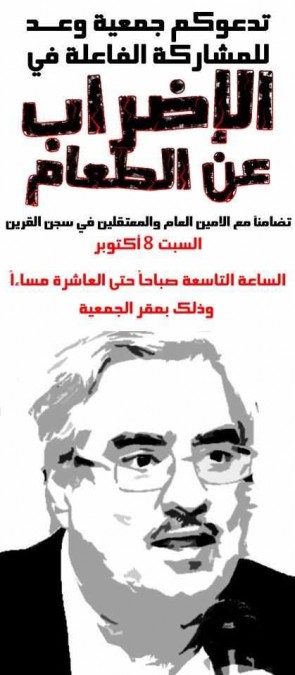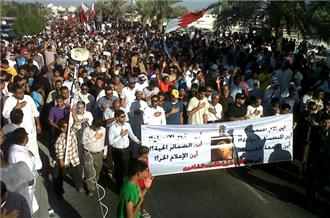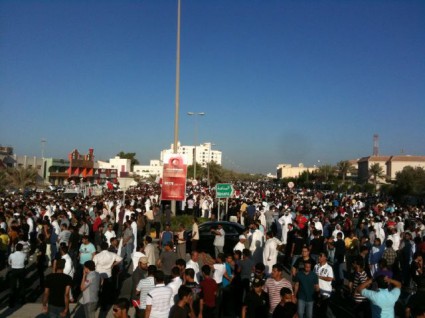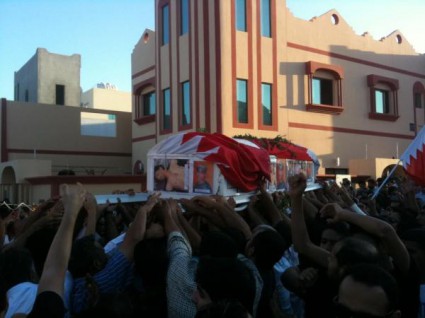An Education is a Dangerous thing to Oppress – Save the Students!
Urgent Appeal to Ministers of Education in Ireland, UK and US: End the violations against students and educators in Bahrain
Why this is Important
End the violations against students and educators in Bahrain
…PETITION HERE
Over the past few months, the Bahraini regime has committed many violations against students and educators as a form of retribution to their participation and support of the pro-democracy movement. Since the declaration of a state of emergency in March, the authorities have conducted pre-dawn raids on the homes of many students and teachers, detaining some for months with no trial and depriving their families of any knowledge of their whereabouts. According to BCHR estimates, the authorities have arrested 78 students and more than 100 teachers although numbers are believed to be higher. Today tens of students and teachers are still in detention and/or are awaiting trials. Teachers unionists have been sentenced to up to 10 years’ imprisonment and more than 7 students to minimum of 15 years’ imprisonment.
University Students:
More than 500 university students have been expelled for political reasons since March. In August, the King of Bahrain ordered all students to be reinstated, however the University of Bahrain (UOB) and the Bahrain Polytechnic refused to allow more than 70 students back to their studies, putting their futures at risk. Students were subjected to aggressive interrogations where they were accused of going to the Pearl Roundabout, taking part in pro-democracy protests, and posting anti-government posts on their Facebook and Twitter pages, in a violation of their privacy and basic rights.
Despite clear violations, the universities have failed to reinstate some students, referring around 10 students to the public prosecutor which summoned them for investigation in a police station. This raises concerns over the students’ security as they could get arrested any time and face trials, especially since some students are currently awaiting military trials with more than 10 students in detention who have been subjected to torture. Recently 7 students accused with false charges of attempted murder, arson among other charges, in regards to the March 16 government-sponsored thug attack on UOB, have been sentenced to 15-18 years in detention.
[Read more →]
October 7, 2011 No Comments
Inventing “boogey man” and the New Red Scare
Red Scare in Pearl Square
Fears of an Iranian takeover in Bahrain resemble some of the worst paranoia from the Cold War.
BY BRIAN DOOLEY – OCTOBER 7, 2011 – Foreign Policy
For those too young to remember the hot intensity of the Cold War, the mentality of looking for “Reds under the bed” must seem quaint, if not prehistoric. Even so, those fears were real: The Soviet Union really was trying to stir up trouble for the United States, causing overzealous U.S. officials to sniff the air for the whiff of communism at home or abroad.
In the mid-1980s, I was researching anti-apartheid legislation for Sen. Ted Kennedy (D-Mass.), and was continually questioned by other Capitol Hill staffers about possible Soviet links to the pro-democracy movement in South Africa. Was Bishop Desmond Tutu an unwitting Politburo puppet? Did the Kremlin secretly fund the democracy activists? That guy Mandela… if he’s in jail, he must have done something, right?
Such a simplistic mindset would seem vaguely amusing if it were not reappearing in the context of Bahrain, where the United States appears to be running scared of an alleged Iranian hand in the democracy protests of this year. An Oct. 6 Wall Street Journal op-ed warns darkly about Iranian “machinations,” arguing that the protest movement represents a covert attempt to transform the island kingdom into Iran’s 14th province. The U.S. government, perhaps taking its cue from such rhetoric, is now planning to send $53 million worth of Humvees and missiles to the volatile Bahraini dictatorship, although a joint resolution has been introduced in the U.S. Congress to stop the sale.
As the smallest country in the Middle East, Bahrain sits between the regional superpowers of Iran and Saudi Arabia. Its Shiite-majority population is ruled by a Sunni monarchy and Sunni elite. Bahrain’s parliament has few powers, and gerrymandering districts to limit Shiite representation is common practice. When calls for constitutional reforms re-emerged in February, as part of the Arab Spring, they were met with a violent government crackdown that has resulted in the deaths of dozens and the imprisonment of around 1,500 more, many of whom reported a pattern of systematic torture. Dozens of medics have also been targeted — many told me they were arrested and tortured because they treated injured protesters, and confirmed to international media that live ammunition was being used against the demonstrators. …more
October 7, 2011 No Comments
Hunger Strike in Solidarity with detainees at the Qrain prison
Wa’ad invites you to join the hunger strike in solidarity with Wa’ad Secretary General Ebrahim Sharif and his fellow detainees at the Qrain prison, Saturday, 8 October, from 9 AM till 10 PM, at the Wa’ad headquarters, Umm Al Hassam
October 7, 2011 No Comments
Waad Goes on Hunger Strike in Solidarity with Secretary General and Al-Grain Detainees
Waad Goes on Hunger Strike in Solidarity with Secretary General and Al-Grain Detainees
by جمعية العمل الوطني الديمقراطي – وعد on Thursday, October 6, 2011 at 10:57am
National Democratic Action Society “Waad” is organizing a hunger strike in solidarity with its Secretary General Mr. Ebrahim Sharif and his fellow detainees in Al-Grain military prison, who have been on hunger strike for 10 days, protesting against the arrest of women.
The strike will take place at Waad’s headquarters in Um Al Hassam on Saturday, 9 October 2011, from 9AM-10PM.
Al-Grain’s prison administration had refused to provide medical care to Sharif and the political prisoners on hunger strike.
“The decision to go on strike has been taken by the Central Committee in support with our Secretary General and other detained political leaders”, said Deputy Secretary General for Political Affairs, Mr. Radhi Al-Musawi.
He added, “We had expressed our concern regarding the information received from detainees, stating that the prison administration decided to stop providing medical care to them because of their hunger strike, violating all related international standers. Proper care should be provided to them while practicing their rightful right to protest”.
October 7, 2011 No Comments
Hamad’s evils deeds, Bahrain errupts after Security Forces violently attack Mourners
October 7, 2011 No Comments
Whereas it might just be too little too late, but it’s traction nonetheless?
IN THE HOUSE OF REPRESENTATIVES – October 6, 2011
Mr. MCGOVERN introduced the following joint resolution; which was referred to the Committee on Foreign Affairs
HOUSE JOINT RESOLUTION 80
Limiting the issuance of a letter of offer with respect to a certain proposed sale of defense articles and defense services to the Kingdom of Bahrain.
Whereas the Kingdom of Bahrain is a party to several international human rights instruments, including the International Covenant on Civil and Political Rights, adopted December 16, 1966, and entered into force March 23, 1976, and the Convention Against Torture and Other Cruel, Inhuman or Degrading Treatment or Punishment, done at New York December 10, 1984;
Whereas the Government of Bahrain had made several notable human rights reforms during the 2000s;
Whereas, despite those reforms, significant human rights concerns remained in early 2011, including the alleged mistreatment of detained persons and the discrimination against certain Bahraini citizens in the political, economic, and professional spheres of Bahrain;
Whereas this discrimination has included the banning of particular religious groups from holding specific government positions, including the military and security services, without reasonable justification;
Whereas hundreds of thousands of protesters in the Kingdom of Bahrain have significantly intensified their calls for government reform and respect for human rights starting in February 2011;
Whereas independent observers, including the Department of State, Human Rights Watch, Human Rights First, Amnesty International, and Freedom House, found that the majority of protesters have been peaceful in their demands, and that acts of violence by protesters have been rare;
Whereas the Government of Bahrain has systematically suppressed the protests through a wide range of acts constituting serious and grave violations of human rights;
Whereas, according to the Project of Middle East Democracy, at least 32 people have been killed by the Government of Bahrain’s security forces since February 2011;
[Read more →]
October 7, 2011 No Comments
Bahrain on the Brink – Reports following Security Force Attacks on Funeral Procession for 16-year-old Ahmed al-Jaber Murdered by al Khalifa Regime
October 7, 2011 No Comments
Secuirty Force Attack procession for 16-year-old Ahmed al-Jaber
Police clash with funeral marchers in Bahrain
07 Oct 2011 – AlJazerra
Mourners angry over the shooting death of a 16-year-old Ahmed al-Jaber clashed with security forces outside the capital Manama on Friday evening.
Security forces opened fire with tear gas, sound grenades and rubber bullets, injuring at least 11 protesters, activists said. More injuries were expected, though the chaotic scene around a makeshift clinic near the clashes made it impossible to verify the number, Al Jazeera’s reporter in Bahrain said.
Our correspondent witnessed three men bearing bleeding wounds thought to have been caused by rubber bullets, while another man had suffered a severe facial injury after being hit by a sound grenade.
The clashes came after an afternoon funeral march on Friday to honor Ahmed Jaber al-Qattan, a Shia teenager who died after being hit by bird shot fired by security forces during a demonstration on Thursday, according to opposition activists. The demonstration took place in the village of Abu Saiba, west of Manama.
The interior ministry acknowledged in a statement that a medical exam by the public prosecutor found that Qattan died of blood loss resulting from a bird shot injury, but the statement did not say who shot the teenager. The assistant undersecretary of legal affairs said on Friday that an investigation would be launched.
“The martyrdom of young Jaber falls under the systematic oppression of those demanding democracy in Bahrain,” al-Wefaq, the largest Shia opposition group, said in a statement on Friday.
Mourners marched through Shia villages and complained about a lack of international attention [Al Jazeera]
Al Jazeera’s reporter in Bahrain said that at least 10,000 people had joined the funeral march for Qattan, chanting, “We will redeem you, Bahrain” and “Down with Hamad,” a reference to King Hamad bin Isa al-Khalifa, whose family has ruled the island monarchy for nearly 200 years.
The march wound through the villages of Shakoora, Janusan and Karana, swelled with people incensed over the death of a teenager and that the Interior Ministry had confirmed it was the result of bird shot. Qattan was to be buried in Shakoora, his home town.
Predominantly Shia protesters have been demanding more rights and governmental reform in the Sunni-ruled kingdom since the beginning of the year. Shias make up the majority of Bahrain’s population.
Security forces drove encamped demonstrators out of Manama’s central Pearl Square, the focal point of protests, in March, but protesters have continued to come out to the streets in Shia villages.
Hundreds of people have been arrested and scores dismissed from their jobs. Many are being tried in a special security court, and dozens have received lengthy jail sentences. Five people have been sentenced to death.
…source
October 7, 2011 No Comments
Bahrain on the Brink
Bahrain Protesters Clash With Police Near Capital After Teenager’s Funeral
By J. DAVID GOODMAN – October 7, 2011 – NYT
The Interior Ministry acknowledged that security forces had moved to clear the area, but it blamed “vandals” for blocking the highway after the funeral of a teenager who activists said was killed by police officers the day before. “This led to interference of security forces to bring the situation to normal,” it said in a statement.
The clashes, which did not lead to any deaths, followed a week in which the government of Bahrain took steps to present a less punitive approach to antigovernment protesters. On Wednesday, the government’s top prosecutor nullified harsh prison terms, handed down last week, for medical workers accused of antigovernment activities, ordering those in custody to be freed pending retrials.
The prosecution of the medical workers had become a symbol of the government’s tough response to a wave of protests in the spring and had attracted negative international attention.
The protest appeared, from video posted online by Shiite activists, to be much larger than the small demonstrations that have occurred regularly since March, and it was the second time in two months that activists blamed the police for the death of a teenager.
In late August, a 14-year-old-boy died as security forces in Sitra, a restive village to the south of the capital, broke up a small protest. Witnesses said he had been hit in the chest by a tear gas canister.
The authorities identified the teenager killed on Thursday as Ahmed Jaber, 16, and said they had opened an investigation into his death, according to a report by the official Bahrain News Agency.
Rights activists said he had been part of a protest near the capital on Thursday when he was shot in the chest at close range by police officers with birdshot — used to contain crowds — and killed. The Bahrain Center for Human Rights posted a graphic image on its Web page that was said to show Ahmed just after his death, his chest riddled with small, round wounds.
The state news agency said the Interior Ministry would investigate conflicting accounts of his death, including “a report by forensic experts of the Public Prosecution indicating that the death was the result of an injury by a police birdshot” — similar to what the activists described — and another report from the Bahrain International Hospital, where he had been taken, which attributed his death “to a severe drop in the blood circulation and the respiratory system that led to heart failure.”
The mourners accompanying the body on Friday, members of the country’s Shiite majority, pumped their fists and chanted slogans against the Sunni-led government, according to video images posted online. Many carried the red and white flags of Bahrain, an important American ally and host to the United States Fifth Fleet’s naval base.
After the funeral had broken up, activists said the police began using tear gas and sound grenades to disperse the crowd, as protesters lingered on the central highway. Al Jazeera reported that at least four people were injured. There were also reports of gunfire, though it was unclear what type of bullets were being used.
Video posted by LuaLua TV, an independent Arabic-language station in Bahrain, showed protesters massing near security forces as a gaseous haze hung over the highway. Other video, posted by activists, showed young men, holding stones, heading in the direction of security forces firing tear gas. …source
October 7, 2011 No Comments
Peace but not Surrender – October 22nd Public Invited
October 7, 2011 No Comments
Extraordinary number of Mourners at young Ahmed al-Jaber funeral – Obama, Clinton’s unwillingness to stop their brutal and bloody “friend” takes Bahrain to the Brink
October 7, 2011 No Comments
Goodbye brave young Ahmed al-Jaber
October 7, 2011 No Comments
Bahrain Interior Ministry, “Heart Failure not Gunshot” killed young Ahmed al-Jaber
Bahrain announces investigation into death of teen protester
By the CNN Wire Staff – Fri October 7, 2011
(CNN) — Bahraini authorities opened an investigation Friday into the death of a 16-year-old anti-government protester after conflicting reports emerged about how he died.
The Interior Ministry said hospital workers reported the teen died Thursday of heart failure, while a forensic autopsy report by the attorney general found he died of a gunshot wound, according to an official statement released to Bahrain’s state-run news agency.
Gunshot Ahmed al-Jaber before AG Forensic Autopsy
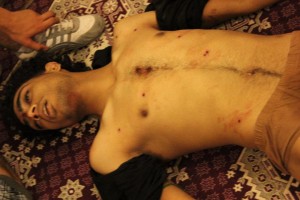
Note the larger Balistic Penetration in Center Chest. Buckshot wounds? “Custom load” of birdshot laced with buckshot?
“An immediate investigation has been issued on the impact of the death of Ahmed al-Jaber to determine the circumstances of death,” the statement said.
Opposition groups al-Wefaq and the Bahrain Center for Human Rights say he was killed by security forces,
Al-Wefaq, the country’s largest opposition party, and the Bahrain Center for Human Rights said the teen, whom they identified as Ahmed Jaber al-Qatan, was was killed during a demonstration in the capital city of Manama.
Protests have lingered in Bahrain for months despite a crackdown by the kingdom’s Sunni monarchy, backed by troops from Saudi Arabia and the United Arab Emirates.
More than 30 people have been killed during the demonstrations, in which activists say Bahraini security forces used live ammunition against protesters.
Opposition groups say more than 1,000 people — mainly Shiites — have been detained and more than 2,000 have lost their jobs for allegedly taking part in the protests. …more
October 7, 2011 No Comments
Obama repeatedly “kicks Bahrain Opposition to the crub” as pleas for his help grow louder
Jailed doctors call for U.S. support in Bahrain
Washington Post – 7-OCt.2011
HAMAD I MOHAMMED/REUTERS – A boy holding a Bahraini flag gestures to the camera as he participates in a rally held by the Shi’ite opposition party Al Wefaq in Tubli, south of Manama, September 22, 2011. REUTERS/Hamad I Mohammed (BAHRAIN)
“We thought there were positive signs in Obama’s speech. He encouraged the government of Bahrain to have real dialogue with the opposition,” he said. “But they are not really active, because the American Navy is stationed in Bahrain.”
Joe Stork, the deputy Middle East and North Africa director at Human Rights Watch, said the administration had been reserved in its criticism since May. “The U.S. government has plenty to say about human rights in Iran, Syria or Libya but rather loses its voice when it comes to Bahrain,” he said.
There are growing worries that Bahrain has become deeply divided along sectarian lines in the aftermath of the uprising. The divisions are driven in part by discontent among the country’s Shiite majority at perceived discrimination by the government, which is led by the Sunni Muslim al-Khalifa royal family.
Alekri, the surgeon, said there were areas of the country he could no longer visit because he feared that Sunni people would attack him. He said he has been described as a killer doctor on state television. His daughter has been bullied in school by her Sunni classmates, he added.
The fear goes both ways.
“Among the Sunni community, there is a fear of the protesters vastly disproportionate to the threat they pose,” said Jane Kinninmont of the London-based Chatham House think tank.
She said a state media campaign portraying Shiite protesters as armed and dangerous had widened the gap between the sects.
The unrest in the kingdom of a million subjects has also stirred existing sectarian tensions in neighboring countries. Bahrain’s Gulf Air has suspended all flights to Iraq, which is led by a majority-Shiite government. Relations have worsened between Iran, where the Shiite theocracy has been vocally supportive of the protest movement, and Saudi Arabia’s Sunni leadership, which sent troops to Bahrain to assist the government in quelling the uprising.
Iraqi Shiite groups, both inside and outside the country, have campaigned on behalf of the Bahraini protesters.
Although the monument at Pearl Square in Bahrain’s capital was destroyed by government forces in March, hundreds of protesters still take to the streets every day.
“Many Shia who were not political before have been alienated as they see nonpolitical, professional Shia people being targeted,” Kinninmont said. “The society is now deeply divided.” …more
October 7, 2011 No Comments
SIS Panel Discussion – The Forgotten Arab Uprising: Politics and Human Rights in Bahrain
POMED Notes: “The Forgotten Arab Uprising: Politics and Human Rights in Bahrain”
October 4, 2011 – BCHR
On Monday, American University’s School of International Service (SIS) hosted a panel discussion entitled “The Forgotten Arab Uprising: Politics and Human Rights in Bahrain.” The panel featured Maryam al- Khawaja from the Bahrain Center for Human Rights, Joe Stork from Human Rights Watch, Saqer al-Khalifa of Bahrain’s Cultural and Media Attaché and Kristin Diwan from the Comparative and Regional Studies program at SIS. The panel was moderated by SIS Professor Shadi Mokhtari, and SIS Dean James Goldgeier gave a brief introduction.
For full event notes, continue reading or click here for the PDF.
Kristen Diwan began by discussing Bahrain’s recent political history, including the development of Bahrain’s bicameral legislature that concentrated power in the upper house, a development she believes caused many citizens to become frustrated with legislative methods of reform. Maryam al-Khawaja then discussed how Bahraini youth drove the initial protests in February, and that demonstrators were not originally interested in ousting the royal family, but sought greater freedoms and political reform. The protesters became galvanized only after the government responded with violence. She also noted that Bahrain became what she called “a country within a country” during the protests, referring to a new sense of freedom of discussion that Bahrainis felt during the movement.
Joe Stork spoke about Bahrain’s demonstrations and the evolution of the government’s reaction. Stork said that Bahrain’s security has not been at stake, so the government can no longer justify its intense response to popular unrest. Saqer al-Khalifa said that “every single person in Bahrain has a sad story to say and this is something that is very unfortunate… [losing] someone in their family, [for example] a protester demanding his rights.” He added, “I am concerned about the children of Bahrain, what kind of future they want to grow [up in] because they saw a dark period of Bahrain.” He mentioned an independent commission looking into the violence that plagued Bahrain this year, and said those responsible for violence “should be held accountable.”
[Read more →]
October 7, 2011 No Comments
UK Groups “wash hands” of King Hamad’s tyranny of terror and injustice
Support Bahrain’s imprisoned doctors
by Fiona Godlee, editor, BMJ – fgodlee@bmj.com – 7-Oct.2011
Many of you will have been following the fate of the 20 Bahraini doctors and other health professionals caught up in the prodemocracy demonstrations in February. After being arrested and in some cases tortured, the doctors were then put through what Amnesty International has called a “sham” trial, and despite international pressure on Bahrain’s government, they were last week given “ludicrous” sentences of up to 15 years (doi:10.1136/bmj.d6336). Another 27 health professionals are facing lesser charges and awaiting verdicts.
Charged with playing a key role in inciting hatred of the regime, distributing false news, and refusing to treat Sunni patients, the doctors say they have been persecuted for treating wounded anti-government protestors. Most of them worked at Bahrain’s only major medical centre, which became the epicentre of the unrest. The doctors deny sectarian bias in treating patients.
News of the sentences has caused outrage among medical and human rights groups. In what Physicians for Human Rights (PHR) calls “the most extreme violations of medical neutrality in the past half century,” commentators from around the world agree that the doctors are being punished for doing what international codes of medical ethics require—treating all patients regardless of their political, ethnic, or religious allegiance (doi:10.1136/bmj.d2768). In light of the events in Bahrain, PHR has called on the United Nations Human Rights Council to appoint a special rapporteur on medical neutrality.
[Read more →]
October 7, 2011 No Comments

